Numerical simulation of detonation of an explosive atmosphere of liquefed petroleum gas in a confned space
2014-02-14NiculaeSerbanCOSTIN
Niculae Serban COSTIN
Military Technical Academy,Sector 5,050141 Bucharest,Romania
Numerical simulation of detonation of an explosive atmosphere of liquefed petroleum gas in a confned space
Niculae Serban COSTIN
Military Technical Academy,Sector 5,050141 Bucharest,Romania
The detonation of an explosive atmosphere from liquefed petroleum gas disseminated in air in a confned space is studied using numerical modeling with software product ANSYS AUTODYN.
Liquefed petroleum gas;Overpressure;Confned space;Explosion limit
1.Introduction
The liquefed petroleum gases,abbreviated as LPG,means those petroleum products which are made up of mixed variables of gaseous hydrocarbons(methane,ethane,butane)and ambient conditions,which are in a state of vapor,but can be easily liquefed.In Romania,liquefed petroleum gas,namely, petroleum product,is composed of mixture of butane(min. 90%)and propane(max.9%)[1].
The characteristics of LPG are defned in SR 66:2007, containing mainly max.12%C3 and min.87%C4,and the vapor pressure is max.7.5 bar[1].
A mixture of 8%propane and 92%butane was chosen for numerical simulation in the paper.This mixture of fuel,mixed with air,will form an explosive atmosphere.The temperatures of self-ignition and explosion limits for LPG components are presented in Table 1.
10 kg of LPG(LPG vapor)which will be subject to the detonation is used to study normal and refected overpressures in a confned space
2.The calculation of the characteristics of LPG-air mixture using CEA program
CEA program enables the calculation of the characteristics of Chapman-Jouguet detonation.Several reports from Zack and Gordon(1960 and 1968)were intended to compare the results for the two ways of calculation of chemical equilibrium.It came to the conclusion that it comes down to the same number of equations.However,in the case of free energy minimization method each chemical species can be treated independently without having to specify a set of special effects,as it is required in the case of the equilibrium constants method[2,3].
Thus,the program that uses free energy minimization method for the calculation of equilibrium composition.The method used to obtain the parameters of engine knocking Chapman-Jouguet is described by Zack and Gordon.There are three stages in the procedure.The frst stage consists in estimating the initial detonation pressure and temperature.The second stage is to use a recurrent formula for improving the parameters obtained in the frst stage.During the third stage the correct values are obtained using an iterative Newton-Raphson procedure[2,3].

Table 1Heat of combustion for various fuels[6].
The program assumes that all gases are ideal processes involved,and the interactions between the phases are neglected[8,10].The equation of state for the gas mixture is

where p is pressure(N/m2);V is specifc volume(m3/kg);n is the number of moles per unit of mass mixture(mol/kg);T is temperature(K);and R=8314.51 J/(mol-1K-1).
Based on the defnition of the gas mixture,n can be written as

where n is the number of moles;and is the number of moles of gas per kg of mixture.
In a conventional manner,an average molecular weight of the mixture is

For iterative purposes,since are valid for the shock equations,it is necessary for these three conservation equations to be reduced to two

For ease of writing the iterative equations,symbols PIIand hIIare used to replace the right member of the above equations.These equations become

Initial estimated temperature ratio is found by calculating the fame temperatures corresponding to enthalpy[9].


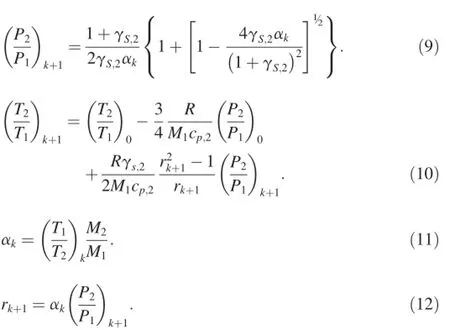

After running the CEA program,the parameters corresponding to a gaseous LPG-air mixture(Table 2)were calculated,which will be introduced into the model of material to be used in AUTODYN.The values were calculated according to the temperature of 18°C and a pressure of 1 bar.
It can be seen from Table 2 that the maximum overpressure corresponds to a volume of 4%LPG vapor into the air.We will make the simulation of detonation for this gaseous mixture.
3.The detonation of an explosive atmosphere using modeling in Ansys Autodyn
LPG-air mixture is defned as a material using the characteristics calculated by C.E.A program.One-dimensional numerical model of this new defned material,with a predefned geometry type“wedge”,for a spherical explosive cargoes in open space is shown in Fig.1.Detonation point is in(0,0).

Table 2Characteristics of gaseous LPG-air mixture calculated with CEA program.

Fig.1.One-dimensional numerical model.
The initial condition is frst defned.The internal energy of the air has the value of 2.068*107 J because the air needs to be at atmospheric pressure(P=1 bar)[7].
The model has been realized with the Euler multi-material solver,specifc to problems in which are modeled gases,fuids or solids that will undergo large deformations.Having as main advantage the fact that the elements of the meshed domain are not distorted and there is no need of a new grid during the simulation,the Euler solver is recommended in case of modeling the shock waves generated at explosive detonation.
Thus,a domain having 1240 mm in length has been defned because the radius of the sphere corresponds to dissemination in air of 10 kg explosive atmosphere,by applying the initial condition previously set(P=1 bar)(Fig.2).
In order to create the numerical models,the following materials existing in AUTODYN library:AIR,TNT and CONCRETE-140 MPA[5]have been used.
CONCRETE-140MPAmaterialwasusedforwalls modeling.Hiermaier,Riedel and Thoma have defned the model properties“RHT Concrete”to be able to represent the pressure and deformation of this material[4].It is also important to specify that the material is not reinforced concrete.
Concrete is used in the proposed numerical model only to evaluate the refected overpressure and not to study the pressure transmitted through the wall,therefore the equations that defne this material won't be presented.
An 2200 mm×2200 mm Euler ideal gas domain,having 221 Ox knots and 221 Oy knots,was defned.This environment has been assigned to the AIR material.For each individual case,the wall was defned by using a Lagrange domain. The wall thickness is 200 mm.The one-dimensional numerical model of an explosive mixture LPG-air was used,which was originally saved as part(part fll-in)and loaded in the twodimensional model.The origin point of detonation was elected to be(0.0).The virtual transducers were set to analyze the normal and refected overpressures.
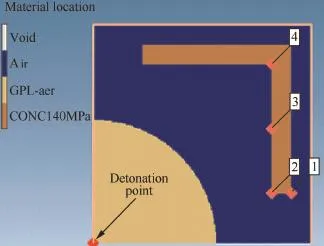
Fig.2.Layout of LPG-air atmosphere against the wall.
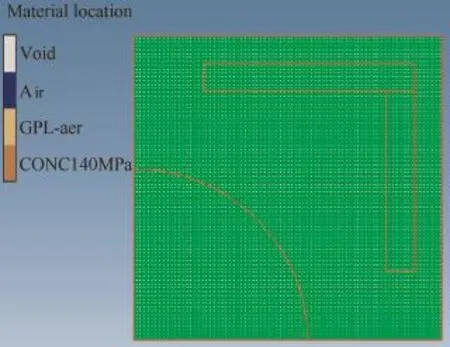
Fig.3.The domain meshing.
In order to fulfll the radiation condition,a transmitting boundary is defned for the external limits of blast part.The transmitting boundary condition allows the blast wave to continue to“go through”the physical boundary without refection[5].The transmitting boundary is only active for fow-out of a grid.Flow-out(Euler)of air and LPG-air is allowed in external limits of air mesh.
Fig.2 shows the layout of the explosive load against the wall and the arrangement of the virtual transducers.Fig.3 presents domain meshing.
In Figs.4 and 5,we can see the evolution of the shock wave front at various time intervals,and the overpressures are shown in Fig.6.
We can notice that,inside the explosive atmosphere,the overpressure is approximately constant,lying around 20 bars, value that is estimated in Ref.[1].As a result of refections with walls,it was formed an overpressures 4-5 times higher. The GPL atmosphere takes up a huge volume compared to ashattering classic explosive.Basically the aerosol has to be disseminated within an enclosed spaceto preserve its homogeneity.
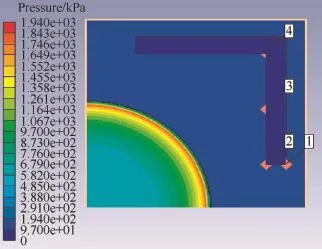
Fig.4.The shock wave front evolution-time 0 ms
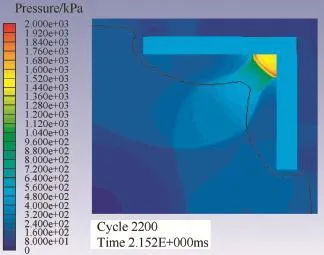
Fig.5.The shock wave front evolution-time 2.152 ms
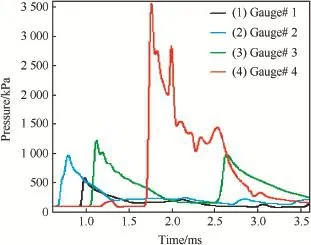
Fig.6.The overpressures in front of the shock wave registered by virtual transducers.
4.Conclusions
In this article the explosive gas mixture composed of LPG in the vapor state and air has been defned as material in the Ansys Autodyn and the simulation of detonation in an enclosed space.In Romania,LPG is made up of butane(min. 90%)and propane(up to 9%).For the chosen explosive atmosphere(92% of butane and 8%of propane),it was demonstrated using the C.E.A software,the fact that the obtained maximum overpressure is corresponding to a percentage of 4%fuel mixture.Detonation produces overpressures in shock wave front of about 20 bars compared with those resulting from the detonation of a quantity of shattering explosive,which makes it possible to produce signifcant damage.
The results from the present study show that the refected overpressure increases in comparison with the incident overpressure,depending on the wall geometry.The values correspond to those obtained experimentally in the study INCDINSEMEX Petros‚ani[11].
Damages recorded following the detonation of explosive atmospheres are mainly inside it,a gaseous mixture acting as an explosive with a much larger volume.To obtain an improvised explosive device using an explosive mixture gas, gaseous mixture homogeneity represents an essential condition in order for the aerosol to be found within the limits of explosivity.To achieve this,it is necessary to disseminate the aerosol in an enclosed space.
Acknowledgments
These researches were conducted in the Military Technical Academy of Bucharest.
[1]Cavaropol DV.Elements of gas dynamics.Plants for LPG and LNG. Bucharest:Publisher Ministry of Interior and Administrative Reform; 2008.ISBN 978-973-745-057-9.
[2]Sanford G,McBride JB.Computer program for calculation of complex chemical equilibrium compositions and applications,I analysis.NASA Reference Publication 1311;1994.
[3]Sanford G,McBride JB.Computer program for calculation of complex chemical equilibrium compositions and applications,II user manual and program description.NASA Reference Publication 1311;1996.
[4]Fairlie GE.The numerical simulations of high explosives using AUTODYN-2D&3D.In:Institute of Explosive Engineers 4th Biannual Symposium;September 1998.
[5]Anon.ANSYS-AUTODYN-Explicit software for non-linear dynamics. ANSYS Inc.;2007.
[6]Daniel A.Understanding explosions.American Institute of Chemical Engineers;2003.
[7]Alexandru Nitu.Experiments and analyses of shock overpressure in free feld,the scientifc bulletin of“Nicolae Balcescu”Land Forces Academy, CNCSIS-329.ISSN 1224-5178,Vol.XVII,Nr.1(33);2012.Sibiu, Romania.
[8]Wen JX,Heidari A,Ferraris S,Tam VHY.Numerical simulation of propane detonation in medium and large scale geometries.J Loss Prev Process Indus 2011;24(2):187-93.
[9]S‚omoiag P,Moldoveanu CE.Numerical research on the stability of launching devices during fring.Def Technol 2013;9(4):242-8.
[10]Xu Fu-ming.On the defnition of propellant force.Def Technol 2013;9(2):127-30.
[11]Octavia Baron.Buliga Vasilica Irina,Sz¨oll¨osi-Mot‚a Andrei,INCDINSEMEX petros‚ani,explosives properties of household LPG,Petrosani;2009.
Received 15 January 2014;revised 21 February 2014;accepted 20 June 2014Available online 22 July 2014
E-mail address:niculae.costin@yahoo.com(N.S.COSTIN).
Peer review under responsibility of China Ordnance Society.
http://dx.doi.org/10.1016/j.dt.2014.06.008 2214-9147/Copyright©2014,China Ordnance Society.Production and hosting by Elsevier B.V.All rights reserved.
Copyright©2014,China Ordnance Society.Production and hosting by Elsevier B.V.All rights reserved.
杂志排行
Defence Technology的其它文章
- Analysis of equivalent antenna based on FDTD method
- Infuence of high frequency pulse on electrode wear in micro-EDM
- Single channel source separation of radar fuze mixed signal based on phase difference analysis
- Combined proportional navigation law for interception of high-speed targets
- Analysis on the resistive force in penetration of a rigid projectile
- Numerical simulation of base fow with hot base bleed for two jet models
